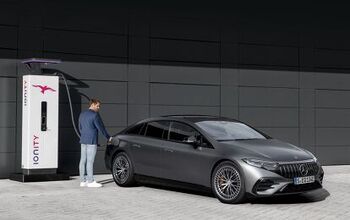Dyson Planning on Building Three Cars, Not Just One

Last year, British appliance manufacturer Dyson said it would devote $2.7 billion towards the development of an electric car. The plan was to build a vehicle using advanced solid state batteries and bring it to market in 2020. There was no shortage of jokes about how a company that primarily produces vacuum cleaners would probably make a car that really sucked wasn’t very good.
However, the joke seems to be on them, as Dyson isn’t working on an electric car at all. Recent reports seem to indicate it’s actually developing three. But you can still snicker about the overly ambitious battery timeline, because there is practically no way the company can hit that target. Instead, it looks as if Dyson will rely on lithium-ion batteries rather than solid state on the first car — effectively eliminating the one big advantage it would have had when entering the market.
A new report from the Financial Times, which managed to get a peek at Dyson’s EV program, said the first car will be used to establish a point of entry into the automotive market, a supply chain, and a potential customer base. As a result, it should have “a relatively low production run.” According to people familiar with the plan, the number would be in the low thousands.
Before you put that plan down, it’s essentially what Tesla did with its first model. Since the introduction of the Roadster, which had a product run of around 2,450 units between 2008 and 2011, the company has managed to increase its staff tenfold and become a darling on Wall Street.
However, Tesla’s first car was also the first model to break the coveted 200-mile range mark. That, along with a difficult-to-ignore CEO, helped get the company a lot of positive attention. Dyson will be entering the market with a vehicle that could be competitive but is unlikely to break any records without help from the solid state cells.
That said, it isn’t abandoning the technology. Dyson has already acquired Michigan-based battery startup Sakti3 for $90 million and announced its intention to build a $1 billion battery factory — specifically for solid state batteries — in the near future. But it also abandoned the University of Michigan’s $200,000-a-year license patent portfolio Sakti3 used as a base for its own research and split with the company’s founder, Ann Marie Sastry. That leaves us wondering if Dyson actually got what it needed from the deal.
The FT article reported that the company is considering a few automotive manufacturing locations. Presently it appears to be leaning toward production based in the United Kingdom, but has also been examining sites in Singapore, Malaysia and China.
While there’s definitely room in the EV market for new entrants, Dyson would need to work quickly to avoid serious competition from established manufacturers. It’s doubtful that any company is going to have solid state technology ready for cars in the next two years, but they are all actively pursuing it.

A staunch consumer advocate tracking industry trends and regulation. Before joining TTAC, Matt spent a decade working for marketing and research firms based in NYC. Clients included several of the world’s largest automakers, global tire brands, and aftermarket part suppliers. Dissatisfied with the corporate world and resentful of having to wear suits everyday, he pivoted to writing about cars. Since then, that man has become an ardent supporter of the right-to-repair movement, been interviewed on the auto industry by national radio broadcasts, driven more rental cars than anyone ever should, participated in amateur rallying events, and received the requisite minimum training as sanctioned by the SCCA. Handy with a wrench, Matt grew up surrounded by Detroit auto workers and managed to get a pizza delivery job before he was legally eligible. He later found himself driving box trucks through Manhattan, guaranteeing future sympathy for actual truckers. He continues to conduct research pertaining to the automotive sector as an independent contractor and has since moved back to his native Michigan, closer to where the cars are born. A contrarian, Matt claims to prefer understeer — stating that front and all-wheel drive vehicles cater best to his driving style.
More by Matt Posky
Latest Car Reviews
Read moreLatest Product Reviews
Read moreRecent Comments
- Calrson Fan Jeff - Agree with what you said. I think currently an EV pick-up could work in a commercial/fleet application. As someone on this site stated, w/current tech. battery vehicles just do not scale well. EBFlex - No one wanted to hate the Cyber Truck more than me but I can't ignore all the new technology and innovative thinking that went into it. There is a lot I like about it. GM, Ford & Ram should incorporate some it's design cues into their ICE trucks.
- Michael S6 Very confusing if the move is permanent or temporary.
- Jrhurren Worked in Detroit 18 years, live 20 minutes away. Ren Cen is a gem, but a very terrible design inside. I’m surprised GM stuck it out as long as they did there.
- Carson D I thought that this was going to be a comparison of BFGoodrich's different truck tires.
- Tassos Jong-iL North Korea is saving pokemon cards and amibos to buy GM in 10 years, we hope.


































Comments
Join the conversation
At least they aren't Lucas batteries. They probably would not pass CA emissions if they were.
What a great way to burn $2.7B. I'd way rather be in the premium vacuum business. Seriously, I bought my wife a Dyson for xmas and she was thrilled. Good on Mr. Dyson for making cleaning desirable again. With cars, I'm not so sure he will see such success.